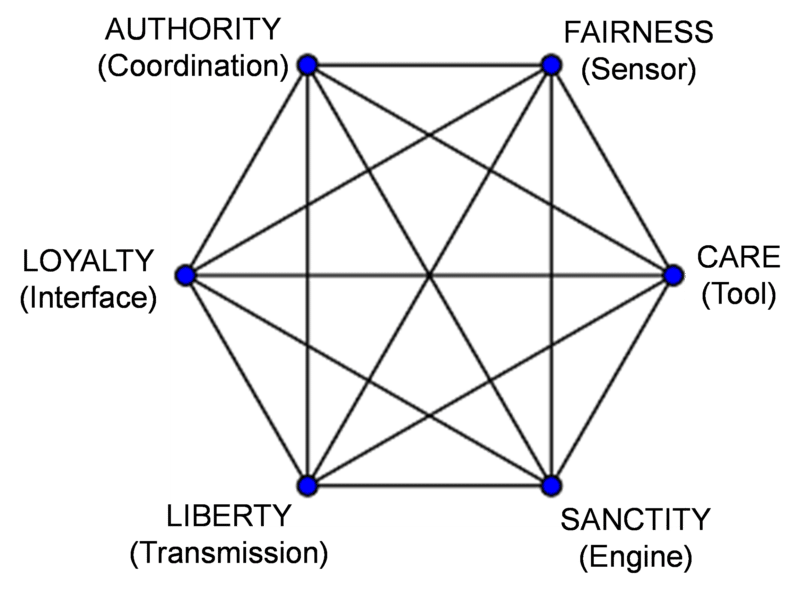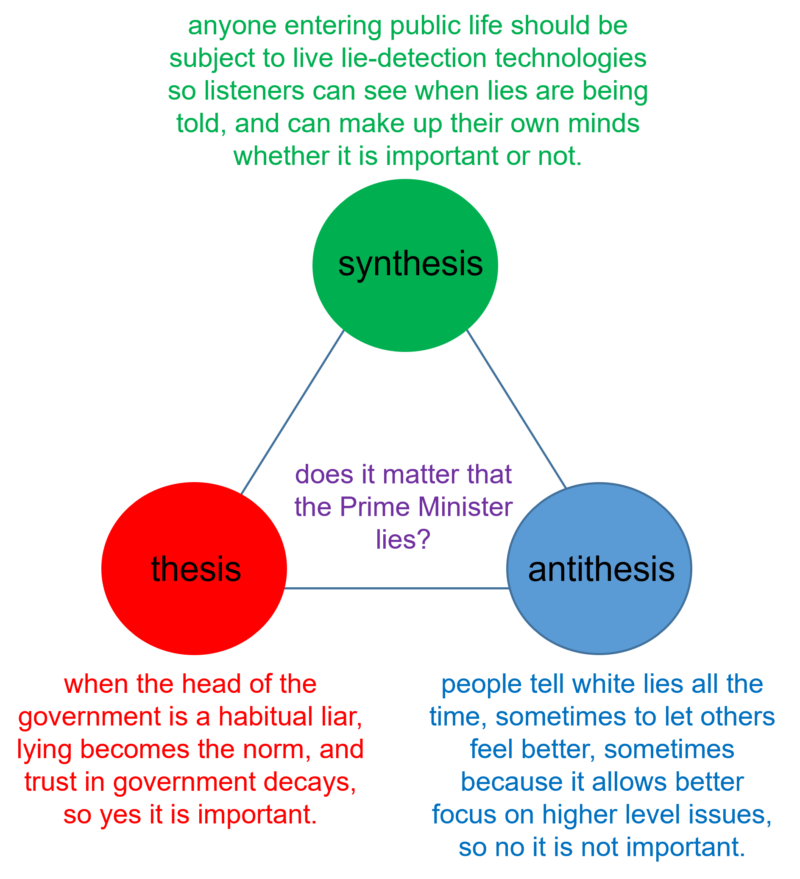“It might take our producers five minutes to find 60 economists who feared Brexit and five hours to find a sole voice who espoused it. By the time we went on air we simply had one of each – we presented this unequal effort to our audience as balance. It wasn’t.”
Emily Maitlis
Both-sides-ism. I’m a big fan of journalist, Emily Maitlis, especially now she’s free of the BBC editorial shackles. She gave a talk at the TV Festival in Edinburgh last year. During the talk she described some of the impartiality policies at the Corporation. As hinted by the above quote, they didn’t sound good. Presenting a balanced view, it turns out, is not an easy thing. Especially, when we live in a world still dominated by Socratic either/or thinking. And, for the most part, don’t understand the contribution of science and scientific thinking to the story.
Take Maitlis’ challenge of attempting to present a balanced view of Brexit fears. The point she was trying to make in Edinburgh was that if, in the course of trying to find two people to discuss ‘both’ sides of an argument, there were hundreds of people willing and able to talk about one side, and only one or two to discuss the other, the eventual two-sided discussion couldn’t possibly be ‘balanced’.
The key danger with this kind of logic can be seen in the murky waters of climate change science at the moment. ‘97% of climate scientists agree…’ is not a justification for declaring the argument as being settled. That’s not the way science works. Science is supposed to be about actively engaging with the 3% that don’t agree, filtering out the nutjobs, and then actively seeking out the contradictions between the different perspectives in order to begin the work of solving them. Science is specifically not about cancelling the 3% just because we don’t like what they have to say. In this kind of situation, it would be entirely appropriate to create a ‘balanced’ argument involving a representative from the 97% and another from the 3%. Hopefully after filtering out the nutjobs on both sides. That filtering job might actually be the bigger problem, but let’s leave that discussion for another day.
The point here is that just because ‘everyone’ believes the Sun revolves around the Earth doesn’t necessarily mean we should exclude the one or two out-of-sync individuals who believe it is the other way around.
The key to getting ‘balance’ right in this kind of situation starts by thinking about factual correctness. No-one today would argue the case that the Sun rotates around the Earth because we have incontrovertible proof that the Earth rotates around the Sun. There’s no need for ‘balance’ here. Similarly, there is no need for ‘balance’ regarding the question of whether the Earth is flat or spherical. There are some people who still believe the Earth is flat, despite the incontrovertible evidence to the contrary, but we don’t need to include them in the argument because we can prove they are nutjobs. And, much as it can be entertaining to interview nutjobs, I think we currently live in a world where there are more constructive ways of using our collective time.
The same applies when we take another, perhaps to some, more controversial fact-based ‘debate’. Is Boris Johnson a liar? To which the factual answer is, of course he is. His many supporters might not wish to acknowledge the enormous body of evidence demonstrating just how much he lies, but that doesn’t make the evidence go away. Johnson is a habitual liar. He says whatever he needs to say to get through his next five minutes – either to say something ‘pithy’ or, more usually, to weasel his way out of a difficult conversation – and he’ll then worry about the consequences later. Usually by throwing his colleagues under a bus. A big red one with ‘Take Back Control’ written down the side. Meanwhile, the need for ‘balance’ is irrelevant if the question we’re trying to answer is about whether or not lying has occurred.
So far so good. But here’s where matters switch from complicated to complex. If the producers chose to reframe the Boris Johnson lying question into something like, ‘Does it matter that Boris Johnson tells lies?’ then the debate immediately shifts from being a fact-based one into one that centres around morality and ethics. And, as I’ve written elsewhere (‘Covid, Complexity & Contradictions’, http://systematic-innovation.com/assets/iss-225-Jan-21.pdf), when it comes to matters of fairness, liberty and the other elements of a system of morals…

… there is no longer such a thing as an either/or ‘right’ answer any more. The reason being that all of us, to some extent recognise and value all six of these moral components, so none of them can be ignored. Or, put another way, any argument that explicitly or implicitly pits one of the elements against another is futile. A meaningful answer to this kind of either/or question can only ever be ‘both’. And if the argument is allowed to continue, it will quickly devolve into an unanswerable debate about which one might be more or less important than the other. They’re both important, dummy.
The ’does it matter that ClownBoy lies?’ question is a moral one. If we want to pursue a balanced version of a debate on this question, while it might be much more difficult – per Maitlis’ producer challenge – to find a person to argue the ‘it doesn’t matter’ side of the discussion, that doesn’t justify stopping the search. Even if the ratio of does/doesn’t speakers ends up being 1000 to 1, ‘balance’ means both sides of the argument should be allowed to make their case. Nutjobs excepted, of course.
If that message doesn’t sit right with you, the first thing I’d say is ‘welcome to freedom of speech’. A concept that seems to increasingly be forgotten by a lot of very polarised, social-bubble-trapped individuals. Freedom of speech notwithstanding, the other reason the message might not sit right with you is that we’re still stuck in the Socratic thinking paradigm. When what we should be trying to do is solve the contradiction rather than merely try and pretend it hasn’t happened.
The simplest way to do this – or at least to better ‘manage’ the contradiction – is for the journalist to mention the fact that it took them five minutes to find a million people to represent one side of the debate and five hours to find one person to represent the other side. That way the audience is able to make their own informed decision about how much credence to give each side of the debate.
That would be a start. Far better would be to make the shift from Socrates to Hegel and include the missing third voice in the discussion. Thesis, Antithesis, Synthesis. Present the status quo, the Thesis that is currently accepted and widely held, then present the Antithesis, articulating the problems with the Thesis (Hegel also called this phase “the negative.”), then bring in a third voice, a person tasked with generating the Synthesis, a new viewpoint that resolves the contradiction and thus demonstrates that it is possible to escape the tyranny of trade-off thinking.

Now, there’s the kind of debate I’d take time to listen to.
And if there’s a need for volunteers to come and do the third-way part, include me in.
